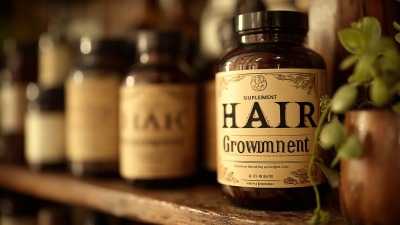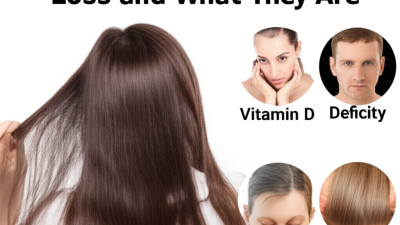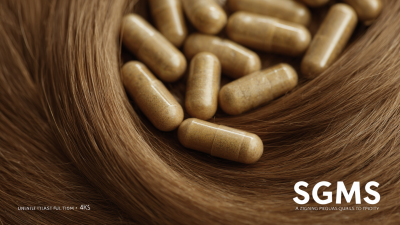
-
Home
-
Products
-
About US
-
FAQ
-
News
-
Tips
-
Contact Us
Leave Your Message
- Phone
- E-mail
- WhatsApp
- WA Business



Hair thinning affects millions worldwide, with nearly 50% of men and women experiencing some degree of hair loss by the age of 50, according to the American Academy of Dermatology. As individuals seek solutions for this common concern, the market for pills for hair growth has surged. A report from Grand View Research suggests that the global hair loss treatment market is expected to reach $10.93 billion by 2025, driven by the increasing prevalence of hair thinning and the rising awareness of hair care products. While these pills promise to restore thicker, healthier hair, it's crucial to delve into the underlying issues associated with their effectiveness and safety. Understanding these challenges can empower consumers to make informed choices about their hair restoration journey.

Hair thinning can be a distressing issue for many, influenced by a variety of factors. One of the most prevalent causes is androgenetic alopecia, which affects over 50% of adults at some point in their lives. This genetic condition leads to excessive hair shedding and can be exacerbated by hormonal changes, including the impact of substances like creatine that may elevate dihydrotestosterone (DHT) levels. Understanding these underlying causes is crucial for those seeking effective solutions.
Moreover, the relationship between hair loss treatments and their side effects has garnered significant attention. Recent studies have highlighted the psychological and physical repercussions associated with certain hair loss medications, including debilitating side effects that persist long after treatment has ceased. As awareness of these issues grows, it becomes increasingly important to approach hair thinning with a scientifically informed perspective, focusing on understanding the biological pathways behind hair loss rather than seeking quick fixes.

When it comes to addressing hair thinning, many people turn to the myriad of pills touted for hair growth. A closer evaluation reveals that while some ingredients may have scientific backing, the efficacy of these pills can vary significantly from person to person. For instance, Minoxidil, traditionally available as a topical treatment, is sometimes found in oral supplements. Its potential to enhance hair growth has been documented, but prescription formulations remain the most reliable.
Safety is another critical consideration when evaluating popular hair growth pills. Many products on the market lack rigorous testing for side effects, leading consumers to unknowingly expose themselves to potential health risks. Side effects can range from mild gastrointestinal discomfort to more severe issues like heart palpitations. Therefore, it is essential for individuals to consult with healthcare professionals before starting any hair growth regimen, ensuring that they choose products that are not only effective but also safe for their health.
This chart illustrates the efficacy ratings of popular hair growth pills based on user reviews and clinical studies. Efficacy is rated on a scale from 1 to 10, with 10 indicating the highest effectiveness in promoting hair growth and reducing thinning.
When it comes to addressing hair thinning, individuals often find themselves at a crossroads between natural remedies and pharmaceutical options. Natural remedies, such as essential oils, biotin supplements, and herbal treatments, have gained popularity for their holistic approach. Many people appreciate these options for being less invasive and having fewer side effects. Ingredients like rosemary oil and saw palmetto are believed to enhance scalp health and promote hair growth. However, the effectiveness of these remedies can vary significantly from person to person, leading to mixed results and sometimes prolonged use without visible improvement.

On the other hand, pharmaceuticals like minoxidil and finasteride offer a more targeted approach. These treatments are backed by research and have shown effectiveness in stimulating hair growth and slowing hair loss for many users. Yet, they can come with potential side effects, such as skin irritation or sexual dysfunction, which can deter some individuals. Ultimately, the choice between natural remedies and pharmaceuticals may hinge on personal preference, the severity of hair thinning, and an individual's willingness to navigate potential side effects versus a more gradual approach with natural options. Understanding the nuances of each can empower individuals to make informed decisions that align with their health goals.
As the quest for luscious locks continues, many individuals turn to hair growth supplements in hopes of combating hair thinning. However, it’s crucial to be aware of the potential side effects associated with these pills. Common ingredients in hair growth supplements, such as biotin and saw palmetto, can sometimes lead to unexpected reactions, including gastrointestinal upset, allergic reactions, and hormonal imbalances. These side effects can vary greatly from person to person, making it essential to consult with a healthcare professional before starting any new regimen.
Additionally, the long-term implications of hair growth supplements are not fully understood. While some users report significant improvements in hair thickness and health, others may experience persistent side effects that outweigh the benefits. It’s important to look closely at the ingredient list and choose products backed by scientific research. Being vigilant about your own body’s response to these supplements can help you navigate the complex world of hair growth solutions while minimizing adverse effects. Always remember that natural remedies, lifestyle changes, and proper hair care can also play a significant role in promoting healthy hair growth without the risks associated with pills.
| Supplement | Common Ingredients | Potential Side Effects | Effectiveness | User Feedback |
|---|---|---|---|---|
| Biotin | Biotin, Vitamin B | Skin rash, Acne | Moderate | Mixed reviews |
| Saw Palmetto | Saw Palmetto extract | Digestive issues, Headaches | Variable | Positive for some |
| Minoxidil | Minoxidil | Scalp irritation, Dizziness | High | Widely effective |
| Iron Supplements | Iron, Vitamin C | Stomach upset, Constipation | Low to Moderate | Effective for deficiency |
| Omega-3 Fatty Acids | Fish oil, Flaxseed oil | Nausea, Fishy aftertaste | Moderate | Supportive feedback |
When it comes to promoting healthy hair growth naturally, incorporating the right nutrients into your diet is crucial. Key vitamins such as Biotin, Vitamin D, and Vitamin E play essential roles in supporting hair health. Biotin, often referred to as the "hair growth vitamin," helps strengthen the keratin structure of hair. Meanwhile, Vitamin D encourages the hair follicles' growth cycle, potentially reducing the risk of hair thinning. Foods rich in these vitamins include nuts, seeds, leafy greens, and fatty fish, which not only enhance hair growth but also improve overall wellness.
In addition to dietary changes, adopting a proper hair care routine can further promote healthy hair growth. Gentle cleansing techniques and avoiding heat styling can prevent unnecessary damage. Natural oils like coconut and jojoba oil can nourish the scalp and strengthen hair strands. Regular scalp massages also stimulate blood circulation, promoting nutrient delivery to hair follicles. Embracing these natural methods not only fosters a healthier environment for hair growth but also instills confidence as you nurture your mane back to vitality.





